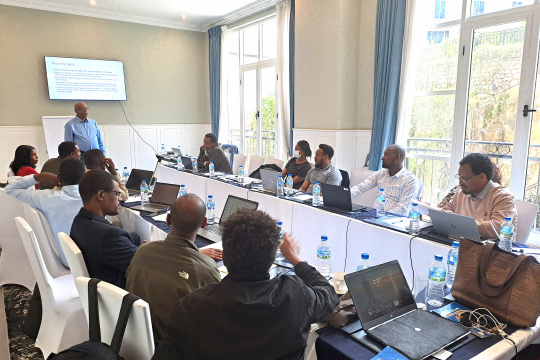The two-day training workshop was organized to equip participants with the knowledge and tools to design and implement effective environmental policies that address environmental challenges.
On July 5-6, 2024, the Environment and Climate Research Center (ECRC)/EfD-Ethiopia conducted a capacity-building workshop on environmental policy instruments (EPI) for Inclusive Green Economy (IGE) alumni (2021 and 2022) and fellows (2023 and 2024). Here participants representing different institutions like the Ministry of Water and Energy, the Ministry of Transport and Logistics, the Ministry of Agriculture, the Ministry of Planning and Development, the Petroleum and Energy Authority, and the Environmental Protection Authority gained knowledge and tools required to design and implement effective environmental policies.
In his welcome remarks, Dr Abebe Damte (ECRC Director and Senior Research Fellow) commended the participants for participating in the training calling it a valuable and informative experience. He revealed that while the training is part of the IGE capacity-building aspects, the plan is to continue training civil servants long after the IGE program.
Prof. Alemu Mekonnen from Addis Ababa University and a senior research fellow at ECRC illustrated how EPI development is motivated by market failure, behavioral biases and anomalies, policy or institutional failure, and property rights. According to Prof. Alem, interdisciplinarity (combining natural and social sciences with economics) can improve the feasibility of environmental policies and reduce implementation costs. He said it is important to classify pollutants when designing EPI and setting feasible zero-pollution targets. He later shared successful and failed policies from across the globe to demonstrate the importance of selecting appropriate policy instruments in addressing environmental challenges.
Dr. Zenebe Gebreegziabher (Senior Research Fellow) exemplified the selection process of EPI for specific environmental challenges and policy objectives by highlighting the efficiency of the policy instrument, cost-effectiveness, equity, dependability, and feasibility among the many. He underscored the role played by uncertainty, information asymmetry, politics, and enforcement during the selection process. His presentation triggered a lively discussion with participants arguing that most current policies and strategies in the country do not consider most of the discussed factors.
While discussing the evaluation of environmental policies, Dr. Abebe Damte elaborated on the strengths and weaknesses of ex-ante and ex-post evaluation methods used to assess the performance and impact of EPI implementation before presenting practical evaluation approaches from Ethiopia and abroad.
During the group discussions, participants reviewed different Ethiopian national policies identifying gaps, advantages, disadvantages, and their applicability. The workshop proved to be a valuable platform for the senior civil servants to deepen their knowledge of EPI development, implementation, and evaluation thus driving environmental protection and sustainable development in Ethiopia.
In his closing remarks, Mr. Alebel Dessie, the Deputy Director General at the Policy Studies Institute (PSI), lauded the participants and encouraged them to continue cooperating with ECRC and PSI for a greener future.
By: Asaye Ketema
